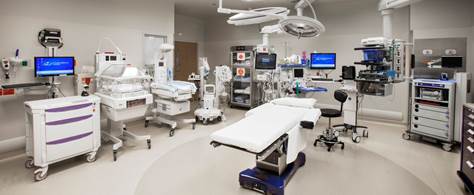Labor & Delivery
From the time you come to Owensboro Health in labor, to the moment you welcome your new baby, you’ll enjoy family-centered maternity care in a calming environment.
When You Think You’re in Labor
When you experience signs of labor, ask a loved one to drive you to the hospital.
Signs of Labor Include:
- Cramping in your legs
- Nausea
- Pressure in your lower back
- Stronger, more frequent contractions
- Water breaking
If you preregistered, just give us your name, and we’ll take care of the rest. Otherwise, you’ll spend a few minutes sharing basic medical and contact information.
Next Steps in Your Maternity Experience
After checking in, you’ll move to our obstetric emergency department while we determine if you’re in labor. If appropriate, you and up to two of your support people will then move to a private, homelike labor and delivery room that includes:
- Private bathroom
- Flat-screen TV
- Birthing bed
- Neonatal care station
- Sophisticated technology to monitor your and your baby’s health
You’ll receive continual support from registered nurses who receive ongoing training in fetal monitoring and care of women in labor. Your nurses are certified in advanced cardiac life support, so you can trust them to provide high-quality care in the unlikely case of an emergency.
If you are getting an epidural, you can expect the procedure to take place approximately 30-45 minutes before you begin to push.
C-section Care

If you need a C-section, rest assured that your labor nurse and OB-GYN will remain with you each step of the way. You’ll also benefit from surgical technologists who have Association of Surgical Technologist certification, meaning they’re extensively trained to help keep you safe and assist your surgeon during the operation.
Your support person may accompany you to one of our surgical suites for comfort and encouragement. If additional loved ones came with you to the hospital, we’ll keep them informed of your progress.
Planned C-sections
- For your safety, you may drink ONLY clear liquids in the eight hours before arriving at the hospital. This includes water, clear soft drinks, black coffee & tea.
- Please remove all jewelry, body piercings and fingernail polish.
After Childbirth
After delivery, you’ll move to a private postpartum room that includes:
- A chair that folds out into a bed for a visitor
- A large flat-screen TV
- A private bathroom
- Free internet access
- In-room dining
- Large windows for calming, natural light
- Warm, homelike décor
Unless your baby needs neonatal intensive care, they will stay with you in your room so you can bond. This is called “rooming in.”
The World Health Organization, the American Academy of Pediatrics and many other medical experts recommend rooming in for the benefit of mother and baby. The benefits include:
- You and your baby will sleep better.
- You can work with the nurses to learn how to care for your baby before you go home.
- You’ll be given more time to practice kangaroo care.
- Your baby will cry less and breastfeed.
You will not be alone during this time, though. Your team of nurses will be there with you through it all to offer support and answer any questions.


